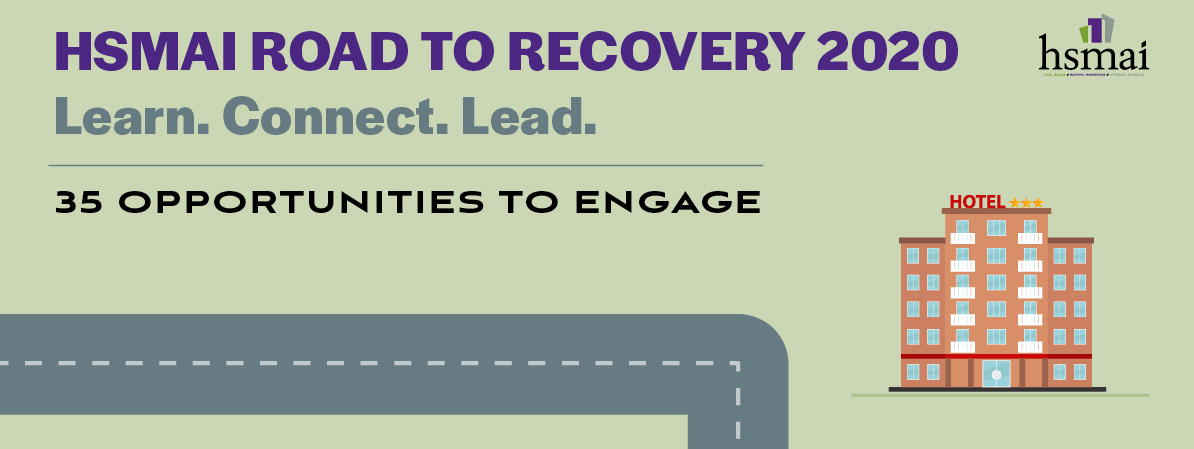By Kaitlin Dunn, Writer, Hospitality Sales & Marketing Association International (HSMAI)
 As part of HSMAI Road to Recovery 2020, leading economic Bernard Baumohl discussed “The Changing Economic & Business Landscape” during a webinar on Sept. 29, offering his predictions for the hospitality industry and the U.S. economy overall for 2021. “We are in the middle of a Category 5 economic hurricane,” said Baumohl, chief global economist at the Economic Outlook Group LLC. “We have to brace ourselves for what’s likely to be very bumpy ride.”
As part of HSMAI Road to Recovery 2020, leading economic Bernard Baumohl discussed “The Changing Economic & Business Landscape” during a webinar on Sept. 29, offering his predictions for the hospitality industry and the U.S. economy overall for 2021. “We are in the middle of a Category 5 economic hurricane,” said Baumohl, chief global economist at the Economic Outlook Group LLC. “We have to brace ourselves for what’s likely to be very bumpy ride.”
Baumohl explained that there are four main factors that will affect the economy over the next year or more: the path of coronavirus, Congress’s next stimulus package, the outcome of the presidential election, and what happens after the virus is an active threat. Then Baumohl laid out what he believes to be the most likely scenarios — Joe Biden winning the presidency, a vaccine becoming widely available in early 2021, and Congress passing a strong stimulus package in early 2021.
“We have to be patient, because recovery is going to take time,” Baumohl said. “I cannot tell you when, because it depends to some extent on all of these factors.”
THE PATH OF CORONAVIRUS
As scientists continue to work to develop an effective vaccine against COVID-19, there are three possible scenarios, according to Baumohl:
Scenario 1: The vaccine becomes widely available during the first half of 2021. We will see higher rates of infection between now and then. After the vaccine comes out, deaths go down, but with no pandemic stimulus package (or with a weak package), Baumohl estimated the probability of a recession at around 50 percent. This is the scenario that Baumohl said is most likely to occur.
Scenario 2: The public won’t have access to the vaccine until late 2021. This means that infection rates remain high through 2021, business failures accelerate, and more workers are unemployed. If no stimulus package is released, Baumohl put the recession probability at 90 percent.
Scenario 3: COVID-19 may never go away — with or without a vaccine. “I don’t mean to unnerve anyone, but we have to keep this in the back of our mind,” Baumohl said.
CONGRESSIONAL STIMULUS PACKAGE
“We are in a race against time,” Baumohl said. “We need this financial bridge, a lifeline to keep businesses afloat and make sure households are full. We need to make sure that stimulus package is available until we get a vaccine.”
Baumohl predicted that a stimulus won’t be passed this year, leading to a further 5-percent decline in the economy. Right now, Baumohl said, Congress is more concerned with holding Supreme Court hearings than addressing another stimulus package, which means that a package likely won’t be passed until after the election — and possibly not until the next president takes office. “It is crucial for a financial vaccine for the economy for the duration until we get a coronavirus vaccine,” Baumohl said. “What is the most critical is funding for state and local governments, because their budgets have been decimated. Forty-nine are operating under a balanced-budget requirement, so if they don’t get more money, they have to cut jobs.”
Other critical parts of a stimulus package, according to Baumohl, include extending the $600 pandemic unemployment assistance through January and expanding the Paycheck Protection Program to keep people employed. Baumohl praised the Federal Reserve for the steps it has taken during this time, including dropping short-term rates and opening lending facilities to make sure there is ample credit and liquidity. “There’s not much more they can do,” he said. “Any more support has to come from Congress.”
The hospitality industry in particular is in dire need of support. Baumohl noted that the latest proposal in the House of Representatives includes funding for the restaurant industry but nothing for the lodging industry. Because airlines, hotels, and other travel and service-related companies are still making large layoffs, this means that none of the companies see recovery coming anytime soon.
THE PRESIDENCY
Baumohl examined two scenarios: if Donald Trump is reelected and if Joe Biden is elected, in each case assuming that both houses of Congress are controlled by the same party as the president. By examining data from nonpartisan websites FiveThirtyEight, The Cook Political Report, and RealClearPolitics, he concluded that Joe Biden will win the White House.
If Biden wins, Baumohl said, we are looking at 3.4 percent growth in 2021 and 4.3 percent growth in 2022, including a generous pandemic stimulus package. He also predicted more spending on climate protection, education, and health care, an increase in corporate and high-income taxes, less uncertainty over U.S trade policies, setting the stage for more business investment, and Jerome Powell’s reappointment as Federal Reserve chair, bringing stability to the market.
If Trump wins, he said, we are looking at 2.2 percent growth in 2021 and 2.6 percent in 2022. Baumohl predicted we will see more tax cuts and additional spending on infrastructure and border security, but because Trump has stated he wants to focus on debt reduction, social policies such as Social Security and Medicare will be cut because money will not be coming in from taxes. He also predicted that geopolitical tensions would increase and that Jerome Powell would not be reappointed as Fed chair, leading to more unstable markets.
POST-COVID WORLD
Whatever happens with the first three factors, companies and individuals will have to readjust to the new reality of life after the pandemic. Baumohl listed 10 factors that will have an impact:
1. Economic divide: Low-income households and minorities have suffered disproportionality from the disruption brought about by COVID-19, leading to a widened income-inequality gap, limiting the U.S. growth rate for years.
2. Deglobalization: Due to rising wages, geopolitics, and high shipping costs, China is no longer the world’s manufacturing hub, which could bring some production back to the United States.
3. Environmental awareness: We’re seeing more investments in sustainability and renewable-energy sources.
4. Telework: We will see more employees working remotely, which is cost-efficient for businesses.
5. Less travel: Corporate travel as we knew it is over. Baumohl predicted that 10 to 15 percent of business travel will never return.
6. Changes in human behavior: Cash is being used even less than it was before the pandemic, and people are migrating away from urban centers.
7. Public health: Public health becomes the highest national security priority, leading to less reliance on other countries for medicines and medical equipment.
8. Ecommerce: Online shopping dooms large retail malls.
9. Xenophobia: The fear of future foreign-born pathogens entering the United States will raise barriers on immigration and trade.
10. Debt: Politicians may pressure the Federal Reserve to monetize massive debt.
Baumohl also noted that on a global level, 93 percent of countries are in recession, and that number won’t bounce back until international travel returns to normal. Other hazards include people’s confidence in taking a vaccine, the budget deficit, the stock market potentially bursting, and trade wars.
Watch Bernard Baumohl’s full presentation on “The Changing Economic & Business Landscape.”
